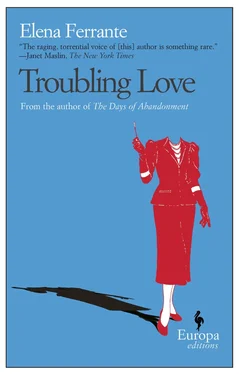I then went into the bathroom. There was neither toothbrush nor toothpaste. Her old blue bathrobe was hanging on the door. The toilet paper was nearly finished. Beside the toilet there was a half-full garbage bag. There was no garbage inside: instead there was the stink of a tired body preserved by clothes that are dirty or made of an old fabric, every fiber saturated with the humors of decades. I began to take out, piece by piece, with a slight disgust, all my mother’s intimate garments: pink and white underpants, much mended and with ancient elastic that showed here and there through the torn seams, like train tracks in the gap between one tunnel and the next; shapeless, threadbare bras; undershirts full of holes; garters of the sort that were used forty years ago and that she had kept for no reason; panty hose in a sorry state; faded slips, with yellowed lace, that had been out of fashion and obsolete for a long time.
Amalia, who had always dressed shabbily because she was poor but also because she was in the habit of not making herself attractive — a habit acquired many decades earlier to placate the jealousy of my father — seemed to have suddenly decided to get rid of her entire wardrobe. I remembered the only garment she had been wearing when they fished her out: the elegant brand-new bra, with the three “V”s that joined the cups. The image of her breasts wrapped in that lace increased my unease. I left the garments scattered on the floor, without the strength to touch them again; I closed the door and leaned against it.
But to no purpose: the entire bathroom jumped over me and recomposed itself in front of me, in the hall: Amalia now was sitting on the toilet and watching me closely while I removed the hair from my legs. I coated my ankles with hot wax and then, groaning, pulled it away from the skin, with a decisive gesture. She, meanwhile, was telling me that as a girl she had cut the black hair off her ankles with scissors. But it had grown back immediately, stiff as coils of barbed wire. At the beach, too, before putting on her bathing suit, she shortened her pubic hairs with scissors.
I put the waxing cream on her, although she tried to shield herself. I spread the wax carefully on her ankles, on the inside of her firm thin thighs, her groin, reproaching her meanwhile with unreasonable harshness for her mended slip. Then I peeled off the wax while she observed me impassively. I did it carelessly, as if I wanted to subject her to a painful trial, and she let me, without saying a word, as if she had agreed to the trial. But her skin didn’t resist. It turned fiery red and then immediately purple, revealing a network of broken capillaries. “It doesn’t matter,” she said, “it will pass,” while I weakly reproached myself for what I’d done to her.
I reproached myself more intensely now, as with an effort of will I tried to send the bathroom back behind the door I was leaning against. To manage it, I moved away from the door, let the image of her purple legs fade into the hall, and went to the kitchen to get my purse. When I returned to the bathroom, I looked carefully among the underpants that were lying on the floor and chose the pair that seemed to me the least worn. I washed, and changed my tampax. I left my underpants on the floor, among Amalia’s. As I passed the mirror I smiled involuntarily, to calm myself.
I don’t know how long I sat beside the kitchen window, listening to the din in the alley, the traffic of motorbikes, the tramp of feet on the pavement. The street gave off an odor of stagnant water that rose through the scaffolding. I was exhausted but didn’t want to lie down on Amalia’s bed or ask Uncle Filippo for help or telephone my father or look again for Signora De Riso. I felt pity for that world of lost old people: confused by images of themselves that went back to bygone eras, they were sometimes in harmony, sometimes at odds with the shades of things and people of the past. Yet I had trouble keeping myself on the margins. I was tempted to link voice to voice, thing to thing, fact to fact. Already now I felt Amalia return, wanting to observe how I rubbed creams into my skin, how I put on my makeup and took it off. Already I began to imagine resentfully a secret old age in which she played with her body all day, as perhaps she would have done as a young woman if my father had not read in such games a desire to please others, a preparation for infidelity.
I slept no more than a couple of hours, without dreams. When I opened my eyes, the room was dark and from the open window came only the nebulous glow of the streetlamps, diffused over a segment of the ceiling. Amalia was up there like a nocturnal butterfly, young, perhaps twenty, wrapped in a green bathrobe, her stomach swelled by advanced pregnancy. She lay on her back, and although her face was serene, her body, caught in a painful spasm, twisted convulsively. I closed my eyes to give her time to detach herself from the ceiling and return to death; then I reopened them and looked at the clock. It was two-thirty. I slept again but only for a few minutes. Then I fell into a torpor crowded with images, in which, without wanting to, I began to tell myself about my mother.
Amalia, in my waking sleep, was an olive-skinned, hairy woman. Her hair, even when she was old, even when it was faded by the salt air, gleamed like the skin of a panther, and it was thick, so thick that no wind could penetrate. It smelled of laundry soap, but not the dry kind, with a ladder printed on the package. It smelled of a brown liquid soap that was bought in a basement: I remembered the tickle of dust in my nostrils and throat.
The soap was sold by a fat, hairless man. He scooped it up with a trowel and stuck it on thick yellow paper, depositing with it a stench of sweat and DDT. I ran to Amalia breathlessly, holding the package and, with puffed cheeks, blowing on it, to get rid of the odors of the basement and of that man; I’m running the same way now, even though so much time has passed, with my cheek on my mother’s pillow. And she, seeing me arrive, is already loosening her hair, and it comes undone as if she had sculpted it in spirals above her forehead and the blackness of the hairdo were changing molecular structure under her hands.
Her hair was long. Amalia was always undoing it, and washing it took not just soap but the entire container of the man in the cellar at the foot of steps that were white with ashes or lye. I suspected that at times my mother, escaping my surveillance, went and dipped her hair straight into the barrel, with the consent of the man in the shop. Then she would turn toward me gaily with her face wet, the water streaming down her neck from the tap in our kitchen, eyelashes and pupils black, eyebrows drawn with charcoal, lightly whitened by the suds that, arching over her forehead, fragmented into drops of soap and water. The drops slid down over her nose, toward her mouth, until she caught them with her red tongue, and it seemed to me that she was saying: “Good.”
I didn’t know how she managed to be in two different spaces at the same time, in the soap barrel in the cellar, in her blue slip, the straps falling off her shoulders and down her arms; and meanwhile abandoning herself to the water in our kitchen, which was giving her hair a liquid sheen. Certainly I had dreamed it that way countless times with my eyes open, as I did now yet again, and yet again felt a painful embarrassment.
The fat man in fact was not content with standing and watching. In summer he dragged the barrel outside. He was bare-chested, bronzed by the sun, and wore a white handkerchief tied tight around his forehead. He poked around in the container with a long stick and, sweating, twisted the shining mass of Amalia’s hair. Meanwhile, down the street, a steamroller crackled, advancing slowly with its big cylinder of gray stone. Another man drove it, thickset and muscular, also bare-chested, the hair in his armpits curly with sweat. He wore a type of khaki trousers unbuttoned in such a way as to show, at the level of his stomach, a frightening hollow, and, settled on the seat of the machine, he surveyed the dense and shiny tar of Amalia’s hair as it slid out from the tilted drum and extended over the crushed stone, steaming, and rippling the air. My mother’s hair was pitch and it spread out into a luxuriant down that thickened in the prohibited places of the body. Prohibited to me: she wouldn’t let me touch her. She hid her face, tossing the curtain of hair over it, and offered her neck to the sun to dry.
Читать дальше












